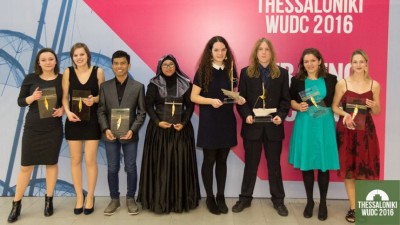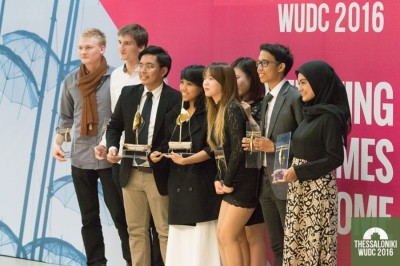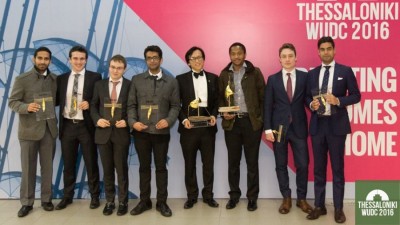„And the winners are“: Die Weltmeister 2016
Die Sieger der World Universities Debating Championships (WUDC) 2016 wurden am 3. Januar auf der Abschlussfeier in Thessaloniki gekürt. In den Kategorien English as a Foreign Language und English as a Second Language konnten die Teams aus Jena (Tina Rudolph und Patrizia Hertlein) und Aachen (Marc-André Schulz und Ruben Brandhofer) für Deutschland den Titel des Vize-Weltmeisters holen.
English as a Foreign Language (EFL)
Zu der Streitfrage „This house believes that campaigners for refugee protection should not
use pictures displaying the graphic suffering of refugees as part of their advocacy“ konnte das Team aus NTU Athens A die Debatte für sich entscheiden. Sie setzten sich damit gegen FSU Jena A (Eröffnende Regierung), Brawijaya A (Schließende Regierung) und UKIM Skopje A (Schließende Opposition) durch.
Zum Finale gibt es ein Youtube-Video. Die Debatte wurde von Wasifa Noshin als Hauptjuror sowie Sarah Balakrishnan, Joshua Zoffer, Nicholas Chung, Andrew Hume, Nita Rao, Elle Jones, Chanel Chan Choyi und Gabriel Bowes-Whitton juriert.
English as a second language (ESL)
Als Sieger der Debatte ging das Team De La Salle hervor. Sie konnten sich bei dem Thema „This house supports the decline of the nation-state’s power in an increasingly globalized world“ als Schließende Opposition gegenüber Indonesia (Eröffnende Regierung), RHTW Aachen (Eröffnende Opposition) und Seoul (Schließende Regierung) durchsetzen.
Zum Finale gibt es ein Youtube-Video. Hauptjurorin war Helena Ivanov, ihre Nebenjuroren waren John McKee, Edward Miller, Colin Besaans, Arinah Najwa, Samuel Ward-Packard, Sella Nevo, Ely Zosa und Sophie Large.
Open Category:
Das Team Harvard A ist Weltmeister in dieser Kategorie. Es konnte bei dem Thema „This house believes that the world’s poor is justified seeking a complete Marxist Revolution“ als
Eröffnende Regierung die Debatte für sich entscheiden. Vize-Weltmeister dieser Kategorie sind Sydney Union B (Eröffnende Opposition), PEP A (Schließende Regierung) und Hart House A (Schließende Opposition).
Zu diesem Finale gibt es keine Aufzeichnung. Tasneem Elias jurierte als Hauptjuror die Debatte gemeinsam mit Udayan Mukherjee, Sebastian Templeton, Madeline Schultz, Michael Shapira, Buzz Klinger, Duncan Crowe, Syed Saddiq und Shira Almeleh.
Die Themen im Überblick:
R1: (Infoslide: Mercenaries are soldiers for hire outside the national armed forces. They can be hired either as individuals contracted by a state or through companies offering theses services to a state.) This house would allow states to use mercenary forces in combat roles in active military operations.
R2: This house would prohibit the private ownership of art deemed to be culturally or historically significant.
R3: This house believes that all states should collectively aggregate and evenly distribute all profit from mineral wealth globally on a per capita-basis.
R4: This house believes that governments with racially diverse populations should never record the ethnic or racial background or their residents.
R5: This house believes the US should withdraw from East Asia and cede regional hegemony to China.
R6: (Infoslide: A sunset clause provides that a law will expire after a specific date, unless further action is taken to extend it.) This house believes that states should adopt sunset clauses that legally force them to review and either re-authorize or revise their constitutions every generation.
R7: This house supports stronger collective bargaining rights and protections rather than legislated labor market regulations (e.g., wage levels and working conditions).
R8: This house believes that the creation of feminist icons and their cults of personality are good for the feminist movement.
R9: This house believes that that criminal punishments should be based only on the offenders‘ culpability rather than the damages caused by the criminal act or other outcomes derived from the punishment.
Partial Open Octo: This house regrets mainstream, commercial films that depict historical subjugation and/or crimes against humanity.
EFL-Semifinals: This house would retrospectively criminalize excessively risky management practices at economically significant corporations and prosecute the executives responsible for them.
Room 3: This house believes that the IMF and World Bank should pay reparations to countries adversely affected by structural adjustment policies.
EFL-Final: This house believes that campaigners for refugee protection should not use pictures displaying the graphic suffering of refugees as part of their advocacy.
ESL-Quarterfinals: (Infoslide: The Giving Pledge is a campaign founded by Bill Gates and Warren Buffet to encourage the extremely wealthy to donate the majority of their wealth to charity. In addition to its founders, the Pledge has been signed by prominent individuals including Mark Zuckerberg, Elon Musk, Bill Ackman and Paul Singer.) This house would prefer a world in which extremely wealthy people in Western liberal states donate excess money to their governments rather than to charities.
ESL-Semifinals: This house believes the West should prioritize stability over exporting democracy in foreign policy.
ESL-Final: This house supports the decline of the nation-state’s power in an increasingly globalized world.
Open-Octofinals: This house would nationalize all systemically important financial institutions, such as banks and insurance companies.
Open-Quarterfinals: This house supports the establishment of a Black secessionary state within the territory of the United States, the founding of which is supported by the American government.
Open-Semifinals: This house believes that non-Western countries that were once colonized, when fabricating the material culture of national identity (anthems, street names, holidays, flag, etc.) should provilege pre-colonial history and notions of indigeneity over themes of anti-colonial resistance.
Open-Final: This house believes that the world’s poor is justified seeking a complete Marxist Revolution.
Masters‘ Competition R1: Assuming the technology to do so easily and safely exists, this house would force everyone in society to undergo periodoc sex changes.
Masters‘ Competition R2: Assuming you have access to a time machine, this house would go back and kill baby Hitler.
Masters‘ Competition Final: This house would ban the Golden Dawn.
hoe/hug









Moin,
falls es jemanden interessiert: Ich finde es ja immer spannend, wie das Debattieren bei „Debating-Laien“ ankommt. Ich habe das früher bei vergangenen WUDCs schon mal gepostet, habe auch in diesem Wintersemester den Teilnehmern eines Kurses in der ersten Sitzung des neuen Jahres die aktuelle WUDC Finaldebatte gezeigt, ohne vorher das Siegerteam zu benennen. In der Abstimmung nach der Debatte (von der man natürlich nur einen unvollständigen Eindruck erhält, da zwei Debattanten ihre Beiträge online nicht zeigen lassen) das Ergebnis bei 25 Teilnehmern: Gewonnen hat
OG: –
OO: –
CG: 1
CO: 24
Mit ernstzunehmenden Begründungen. In meinen Augen hat OG dennoch zu Recht gewonnen. Weil ich das durch die Debattier-Brille betrachte? Oder einfach Glück habe, dass die Jury das auch so gesehen hat?
Grüße
DS
P.S.: Glückwunsch nach Jena und Aachen!!!